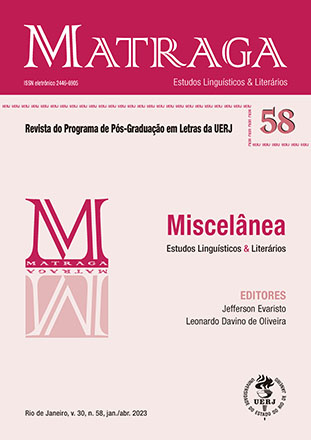Noun incorporation in Asuriní do Xingu
DOI:
https://doi.org/10.12957/matraga.2023.68679Keywords:
Transitivity, Noun incorporation, Argument, Asuriní do Xingu.Abstract
In this article, we analyze the process of noun incorporation in Asuriní do Xingu (Tupí-Guaraní), showing how it can affect the sentence at its different levels. In this language, transitive verbs and intransitive verbs can incorporate nouns. Noun incorporation can present different results and functions, depending on the nature of the incorporated nominal and the host verb. The incorporation of a non-possessed noun decreases the transitivity of the sentence and changes the meaning of the construction, a fact which is in accord with effects of noun incorporation well-attested by linguistic typology. On the other hand, the incorporation of an inalienably possessed noun, as a rule, does not decrease the verbal valence, since in this process (depending on the type of operation performed) the possessor ascends to subject or object. However, in this type of incorporation, it is possible that valence change occurs when the incorporated noun is co-referent with the subject of the clause. In addition, we discuss the disappearance of the morphosyntactic distinction between active intransitive and descriptive intransitive verbs derived by noun incorporation.
Downloads
Downloads
Published
How to Cite
Issue
Section
License
Authorization
Matraga – Scientific Journal of the Post-graduate Program in Arts and Humanities of UERJ is authorized to publish the article submitted here, if it is accepted for online publication. It is attested that the contribution is original, that it is not being submitted to another publisher for publication, and that this statement is the expression of truth.
The works published in Matraga's virtual space – Scientific Journal of the Post-graduate Program in Arts and Humanities of UERJ will be automatically transferred, and your copyright is reserved to Matraga. Its reproduction, in whole or in part, is conditional on the citation of the authors and the data of the publication.

Matraga uses license Creative Commons - Attribution-Non-Commercial 4.0 International.





